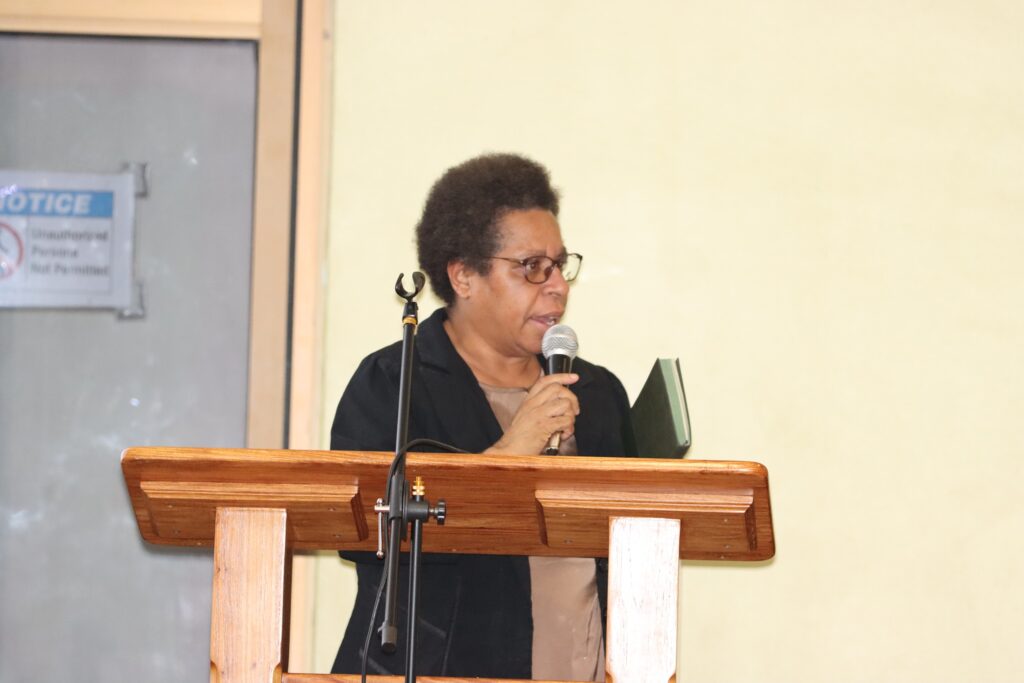Lae, Morobe Province | Thursday, 10 April 2025 – Chairperson of the Papua New Guinea Rubber Board, Ms Josephine Kenni, delivered a landmark address at the National Agriculture Industry Public-Private Sector Partnership Conference in Lae, presenting a detailed and ambitious plan to revitalise the rubber industry. Speaking with clarity and conviction, Ms Kenni positioned rubber not merely as a neglected commodity, but as a strategic national asset with the potential to drive rural development, create employment, and contribute significantly to Papua New Guinea’s economic diversification.
The address marked one of the most comprehensive statements of intent ever made by the Rubber Board, signalling a new era of reform, growth, and farmer empowerment.
Legal Reform and Institutional Strengthening
Ms Kenni began by highlighting the passage of the Papua New Guinea Rubber Industry Act 2022, describing it as a foundational moment that has empowered the Board to operate with greater authority and strategic focus.
“The Rubber Act has enabled us to restructure the sector and establish a more accountable and responsive governance system,” she said. “We now have the legal mandate to regulate planting materials, enforce quality standards, promote fair market practices, and protect the interests of our farmers.”
She added that the Act had also strengthened the Rubber Board’s coordination with the National Department of Agriculture, allowing for better policy alignment, research collaboration, and budget mobilisation.
Development of a National Rubber Policy
Ms Kenni then turned to the upcoming National Rubber Policy, currently in advanced stages of consultation. This policy, she said, will serve as the strategic framework for PNG’s rubber sector from 2025 to 2035.
“The policy outlines our vision for a resilient, market-driven, and inclusive rubber industry. It addresses not only commercial goals but also social equity, environmental sustainability, and farmer welfare,” she explained.
Key focus areas of the policy include:
- Market Access and Price Stability: Mechanisms to stabilise prices and improve access to domestic and international markets;
- Infrastructure Development: Road, port, and processing infrastructure upgrades to improve supply chain efficiency;
- Farmer Support: Revival of the extension service network, training in best practices, and access to affordable inputs;
- Biosecurity and Quality Assurance: Strengthening quarantine protocols and establishing national rubber quality grades;
- Research and Innovation: Increased funding for the development of high-yielding clones, disease resistance, and processing technology;
- Climate Resilience: Promoting rubber as a carbon-sequestering crop to support PNG’s climate commitments.
Ms Kenni said the policy is designed to be a living document, adaptable to emerging market dynamics and technological change.

Restoring Confidence and Supporting Smallholders
A central theme of Ms Kenni’s address was the need to restore confidence among smallholder farmers, many of whom had abandoned rubber in recent decades due to neglect, poor prices, and lack of government support.
“We must earn back the trust of our rubber growers. This begins with being present in the field, listening to their challenges, and delivering real solutions,” she said.
She revealed that the Board is currently undertaking a national farmer registration and profiling programme, which will help identify all active and dormant rubber farmers, assess their needs, and build a farmer database for targeted support.
“Rubber farmers will no longer be invisible. We will know who they are, where they are, and how we can help them,” she stated.
She also mentioned the potential reintroduction of a price support mechanism, to protect farmers from global market fluctuations and provide a guaranteed minimum income.
Investing in Nurseries and Planting Materials
Ms Kenni announced that the Board is rolling out a nationwide programme to establish certified nurseries and distribute improved rubber clones to farmers.
“Quality starts at the seedling stage. We are working with our research partners to produce and distribute high-yielding, disease-resistant planting materials, especially in high-potential provinces such as Western, West Sepik, Central, and East New Britain,” she said.
She also signalled plans to revive legacy rubber plantations and promote outgrower schemes that combine nucleus estates with smallholder networks.
Partnerships and Provincial Engagement
Calling for stronger intergovernmental collaboration, Ms Kenni urged provincial governments to incorporate rubber into their economic development plans and mobilise counterpart funding for sector-specific projects.
“Provincial governments are key. We need them to co-invest in feeder roads, extension staffing, and land mobilisation to bring rubber development closer to the people,” she said.
She also called on the private sector, particularly processors and exporters, to partner with the Board in upgrading processing facilities, improving traceability, and meeting international certification standards.
“We are open to public-private partnerships, provided they respect our farmers, uphold fair trade, and reinvest in communities,” she added.
A National Asset for Inclusive Development
In closing, Ms Kenni emphasised the broader national importance of rubber, particularly as PNG moves towards its 50th anniversary of Independence and seeks to reduce dependence on extractive industries.
“Rubber is not just a crop. It is a national asset that can generate jobs, foreign exchange, and climate resilience. It is a pathway for our young people, our women, and our rural entrepreneurs to enter the formal economy,” she declared.
She said that with firm leadership, investment, and policy consistency, the rubber sector could generate hundreds of millions in export earnings and transform the livelihoods of thousands of rural families.
“Let us not underestimate the power of a tree that can yield for 30 years. Rubber has been asleep, but now we are wide awake. The time to act is now,” Ms Kenni concluded, to loud applause.
Her presentation was one of the standout moments of the National Agriculture Conference, held under the theme “Achieving Our Goals: Public and Private Sector Partnerships to Leverage Investment, Land, and Resources for Implementing the NASP 2024–2033.”
Stakeholders from across the sector praised the PNG Rubber Board’s leadership and pledged support to the implementation of the reforms laid out.
###